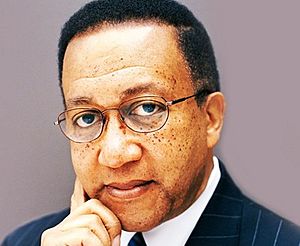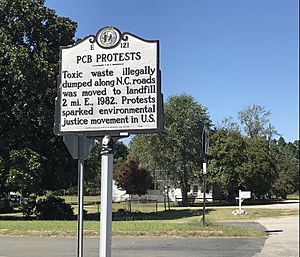Benjamin Chavis facts for kids
Quick facts for kids
Benjamin Chavis
|
|
|---|---|
 |
|
| Executive Director of the National Association for the Advancement of Colored People | |
| In office 1993–1994 |
|
| Preceded by | Benjamin Hooks |
| Succeeded by | Earl Shinhoster |
| Personal details | |
| Born |
Benjamin Franklin Chavis Jr.
January 22, 1948 Oxford, North Carolina, U.S. |
| Education | St. Augustine University University of North Carolina, Charlotte (BA) Duke University (MDiv) Howard University (DMin) Union Theological Seminary |
Benjamin Franklin Chavis Jr. (born January 22, 1948) is an American activist, author, and leader. He is known for his work in the civil rights movement and for fighting for justice for African Americans. Currently, he is the president and CEO of the National Newspaper Publishers Association, which supports Black newspapers across the country.
As a young man, Chavis worked alongside the famous civil rights leader Martin Luther King Jr.. This inspired him to dedicate his life to fighting for equality. He became well-known as the leader of the Wilmington Ten, a group of activists in North Carolina. They were wrongly accused of a crime during a protest and sent to prison.
Later, a higher court found that their trial had been unfair. The group was freed, and years later, the governor of North Carolina officially declared them innocent. After this experience, Chavis continued his work. He became the executive director of the NAACP in 1993 and helped organize the Million Man March in 1995. He also co-founded the Hip-Hop Summit Action Network with music producer Russell Simmons to empower young people.
Contents
Early Life and Education
Benjamin Franklin Chavis Jr. grew up in Oxford, North Carolina. When he was just 12 years old, in 1960, he became the first African American to get a card from the town's segregated public library. This meant that before him, only white people were allowed to use it.
He graduated from high school in 1965 and went on to college. He earned a degree in Chemistry from the University of North Carolina at Charlotte. Later, he studied religion and earned advanced degrees from Duke University and Howard University.
A Leader in the Civil Rights Movement
Working for Change
Chavis became involved in the civil rights movement as a teenager. In 1963, he was a youth coordinator for Martin Luther King Jr. and the Southern Christian Leadership Conference (SCLC). He helped organize young people to fight for their rights peacefully.
In 1970, a young Black man named Henry Marrow was killed in Oxford, and the white men accused of the crime were found not guilty. In response, Chavis organized a protest march to the state capital. He also led a boycott where Black residents refused to shop at white-owned businesses until the town agreed to integrate its schools and public places.
The Wilmington Ten
In 1971, Chavis was sent to Wilmington, North Carolina, to help with the desegregation of public schools. The city had closed the local Black high school, which caused a lot of tension and protests. During this time, Chavis and nine other people, who became known as the Wilmington Ten, were arrested. They were accused of setting a fire.
After a trial that many people felt was unfair, all ten were found guilty. Chavis, who was the oldest, received the longest prison sentence of 34 years. Many people and groups around the world, including Amnesty International, called them "American political prisoners," meaning they were jailed for their beliefs.
Finally, in 1980, a federal court overturned their convictions. The court said the trial was unfair because of "prosecutorial misconduct," meaning the lawyers arguing against them had not followed the rules. All ten were set free. In 2012, the governor of North Carolina gave them all a "Pardon of Innocence," officially clearing their names.
Fighting Environmental Racism
Chavis is known for coining the term "environmental racism." He used this term to describe how communities of color are often chosen as locations for toxic waste dumps and polluting factories.
In 1982, he was part of a protest in Warren County, North Carolina, where a landfill for hazardous waste was planned in a mostly Black community. He said this was a clear example of environmental racism.
In 1986, he published a famous study called Toxic Waste and Race in the United States of America. The study showed that a person's race was the most significant factor in determining where toxic waste facilities were located. Because of his work, many people call Chavis the "Godfather of the Environmental Justice Movement."
Leadership Roles
NAACP Leader
In 1993, Chavis became the youngest-ever executive director and CEO of the NAACP, one of the oldest and most famous civil rights organizations in the U.S. He focused on economic empowerment for African-American communities. He also worked to make sure Black people were included in the growing technology industry.
Under his leadership, the NAACP organized voter education for South African citizens living in the U.S. to help them vote in their country's first democratic elections. He was dismissed from his position in 1994 after a disagreement over the use of NAACP funds.
Hip-Hop and Youth Activism
Chavis has always believed in the power of youth and culture. He saw a connection between the struggles of young people in cities and the rise of hip-hop music. In the 1980s, he began working with hip-hop artists and activists.
In 2001, he and hip-hop producer Russell Simmons co-founded the Hip-Hop Summit Action Network (HSAN). This group brought together artists, industry leaders, and activists to work on issues like education, voter registration, and social justice. HSAN organized large events and protests to demand better funding for public schools. Chavis believes hip-hop can be a powerful tool for positive change.
Personal Life
Chavis was married to the late Martha Rivera Chavis. He is the father of eight children. For fun, he enjoys reading books about chemistry.
Appearances in Popular Culture
- Chavis played a minister in the 1998 movie Belly.
- He appeared in several skits on the albums of rapper Jim Jones.
- He was featured on a track called "The Message" on an album by the rapper Cassidy.
- He appeared in Spike Lee's movie about the Million Man March, Get on the Bus.
- The story of his early activism is shown in the book and movie Blood Done Sign My Name.
 | Kyle Baker |
 | Joseph Yoakum |
 | Laura Wheeler Waring |
 | Henry Ossawa Tanner |


